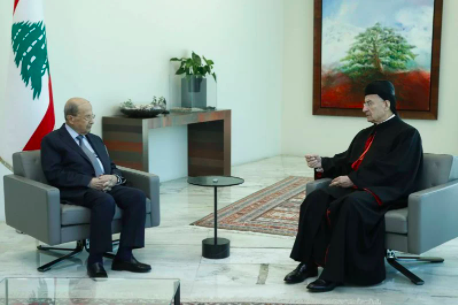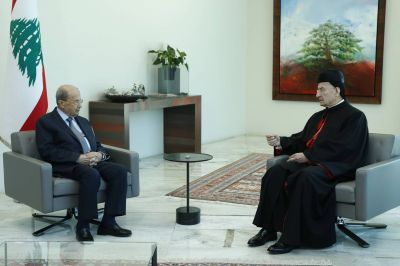
President Aoun and Patriarch Rai in Baabda, June 2, 2021. (Credit: Dalati and Nohra)
The gap between President Michel Aoun and Maronite church leader Patriarch Bechara al-Rai continues to widen. Less than two months ahead of the legislative elections, scheduled for May 15 — which will be followed by the presidential elections, scheduled for October — differences between the two top Maronite figures are increasingly deepening. According to several observers, they could lead to repercussions on the Christian street’s vote.
“There are big differences in points of view between the patriarch and the head of state,” a source close to Bkirki who declined to be named said. “They disagree on major strategic issues. So, I can not say that the relationship between them is good. It is rather average,” he added. The presidency and the Maronite Church mainly disagree on Hezbollah’s weapons and the political positioning of Lebanon, which is unable to define a clear foreign policy.
For nearly two years, Rai has tirelessly pleaded for Lebanon's neutrality in regional conflicts, at a time when Hezbollah, a long-time ally of Michel Aoun, is involved in these conflicts, in Syria or in Yemen, supported by its Iranian sponsor.
Events last week were demonstrative of this rift: While the Maronite Church head was pleading in Cairo for Lebanon to return to the Arab bosom after the recent quarrel with the Gulf countries against a background of Hezbollah’s interference in the region, President Aoun defended, once again, the Shiite party and its arsenal in Europe
“Hezbollah has no influence on Lebanon’s security situation,” he told the Italian daily La Repubblica, on the sidelines of his two-day official visit to the Vatican.
On the other hand, the patriarch has reiterated calls, especially in recent months, to disarm Hezbollah and respect UN resolutions, including Resolution no. 1559 (2004) on “disarming and disbanding all militias” and “the extension of the control of the government of Lebanon over all Lebanese territory,” among other issues.
In Cairo, he escalated his tone a little more, implicitly accusing Hezbollah of being the “reason behind Lebanon’s isolation.”
“The solution lies in declaring Lebanon’s neutrality. Then it will experience prosperity and growth again,” he added.
The legislative elections
“Rai raised the issue of Lebanon's neutrality last week in front of the Egyptian President, Abdel Fattah al-Sisi, who was very much in favor of it,” a figure close to Bkirki said. “Neutrality was also part of the discussions between the patriarch and League of Arab States Secretary-General Ahmed Aboul Gheit, who dwelled on the matter during his meeting the next day, with the United Nations Secretary-General Antonio Guterres,” he added.
In parallel with this politico-diplomatic dynamic, led by the patriarch, the day after the first signs of renewed relations between Beirut and the Arab monarchies, in particular Saudi Arabia, emerged, President Aoun met with Pope Francis and several officials of the Holy See. The trip has been surrounded by some speculation and contradictory information.
Some media outlets close to Hezbollah and the Aounist camp reported that the Vatican called on Bkirki to engage in dialogue with the Shiite party because it is part of the Lebanese mosaic. But the source who is close to the Maronite patriarchate shared with L’Orient-Le Jour another version of the story: “The Vatican and Bechara al-Rai are on the same wavelength. The patriarch was not asked to engage in dialogue with Hezbollah,” he said.
These rumors had been fueled by comments in favor of Hezbollah made by Michel Aoun in his interview with La Repubblica. “The president's remarks were misinterpreted. He wanted to remind that some Lebanese territories are still occupied [by Israel]. And once these lands are liberated, there will no longer be a need for Hezbollah's arsenal,” a source close to Baabda said.
“There too, there is a disagreement between Baabda and Bkirki. The two camps have different views on Lebanon’s positioning in the ‘moumanaa’ camp. And the patriarch cannot stand idly by in the face of this,” said a figure close to Patriarch Rai’s circle.
“The talk about differences between Baabda and Bkirki aims to prevent Christians from voting for the Free Patriotic Movement in the legislative elections,” the source who is close to the presidency said.
Relations between Bkirki and the Aounists were not always good, especially during election seasons. In 2009, the FPM, founded by Michel Aoun, criticized Patriarch Nasrallah Sfeir for statements deemed favorable to the March 14 coalition on the eve of the legislative elections. Therefore, according to the orange party, he influenced the vote of Christians and guided their choice.
For its part, Hezbollah believes that “this is not the right time to argue with the patriarch,” said an official in the party who declined to be named. “We have no problem with the continuation of dialogue with the Maronite Patriarchate,” said Mahmoud Comati, a member of the committee tasked with dialogue between Bkirki and Hezbollah.
Ghada Aoun and Riad Salameh
Another bone of contention between Baabda and the Maronite Patriarchate is the recent prosecution of some banks, as well as the legal tug of war between Mount Lebanon Public Prosecutor Judge Ghada Aoun, who is close to the presidency, and the Banque du Liban Governor Riad Salameh, who is reviled by Baabda and its entourage, in particular the FPM and its leader Gebran Bassil, the son-in-law of the president.
For his detractors, the head of state is going all in before his term expires on Oct. 31, as he vowed to remove Salameh from his post before leaving office.
For his part, the Maronite Patriarch has defended Salameh on several occasions, thus placing himself on the exact opposite side of Aoun. In his homily on Sunday, he openly criticized Judge Ghada Aoun’s measures. He called for an end to “the measures taken by a biased and politicized judiciary,” as well as those targeting banks. The prelate did not, in this vein, hide his apprehensions of torpedoing the elections due to these measures.
“This is not a sin. The patriarch has always defended the top level positions, such as BDL’s governor or the commander-in-chief of the Army,” the source who is close to the prelate said.
On the Baabda side, there are attempts to downplay this disagreement. “These criticisms are not leveled against the presidency, and the patriarch has expressed his point of view,” said the source who is close to Michel Aoun.
He stressed that “the palace has nothing to do with Ghada Aoun’s decision. According to him, Aoun and Rai are “on very good terms” and will meet soon.
This article was originally published in French in L'Orient-Le Jour.
